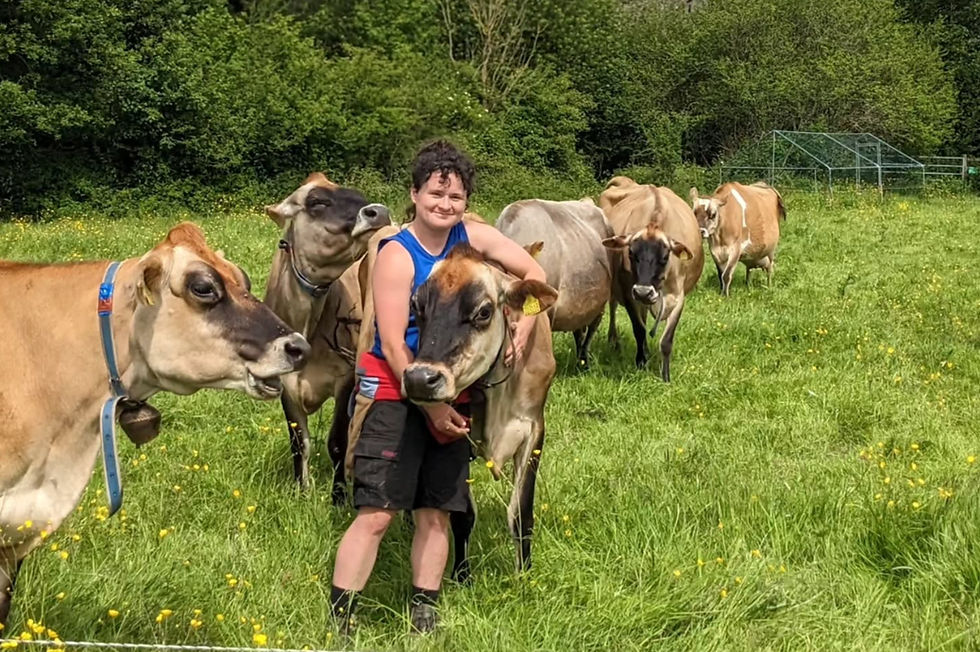Meet Our Team: Jack Fountain, Vegetable Gardener
- tablehurstfarm

- Jun 23, 2025
- 3 min read
June 2025
Many of you know Tablehurst Farm for our livestock, vegetable garden, farm shop, cafe, pie kitchen and care home. But how much do you know about the people who are at the heart of our operation?
In this edition of our “Meet Our Team” series, we are introducing you to our Vegetable Gardener, Jack Fountain. Here we will chat to Jack about why he decided to become a grower, what are the challenges he and the Garden team face, but then what makes all the hard work worthwhile!

Hi Jack, what inspired you to become a vegetable and fruit farmer?
I've always been really interested in food and cooking food, and since childhood I’ve enjoyed being outdoors. My mum was a passionate gardener, so I grew up enjoying spending time gardening with her. I grew up in an agricultural family and therefore always had links to it. In my early 20s, I found myself reading a lot about different forms of agriculture and trying to find a way of farming that really clicked with me. And that's how I came across smaller-scaled organic vegetable production as opposed to large industrial farms. I was taken by how it seems to combine a community aspect of food - the growing of good, healthy produce – with a more ecologically-minded food system. It’s also work that I enjoy rather than automated, repetitive work.
Can you tell us about more about your work at Tablehurst Farm?
I work in the Garden, which at Tablehurst Farm is growing vegetables and fruit. So it's different from those who care for the flowers.
We grow nearly everything from seed. Some growers do buy in transplants, but we are lucky to have a large propagation tunnel, which allows us to grow most vegetables from seed. This is more economic, although it takes more time to sow by hand. We sow into trays of around 100 plugs, and then later transplant them out into the field. Some things we directly sow into either the poly tunnels, if they acquire protection, or straight out into the fields. From then it’s watering, weeding, checking for disease or damage from pests, then monitoring until it's time to harvest.

How do you keep disease and pests away from the vegetables?
With pests it's mainly to do with fleecing. We use fleece which protects plants from birds and fleece which protects them from insects. Common insects are Cabbage White Butterflies or Leek Moths. Badgers are also quite a big problem in this area and they are not so easy to keep away.
Disease prevention is also a challenge, but I think we are at an advantage because we grow a lot of different crops. If there is just one huge field and it gets a particular disease, it spreads through everything and your whole yearly income is ruined. Some years we will have crop failure for a couple of vegetables due to disease but other crops grow well. Through rotations, we prevent disease building up in the soil, so we don’t always grow the same things in the same areas. How much that needs to be done is a point of debate. There is also a saying that unhealthy plants are targeted most by pests and disease. So if you can create healthy soil, that's a good way to prevent all these issues.
What about composting and fertilising?
Compost is hugely important for us here, because that provides a lot of the nutrition - in conjunction with some green manure - for growing the crops. We use compost that is made on the farm, which contains biodynamic preparations. If you compare compost to inorganic fertiliser, it has a whole ecosystem of life in there. We should aim to have healthy soil ecology, which then contributes to fighting pests and disease, and from it we grow tasty and nutritious vegetables.

What is your favourite part of the job?
I used to have an office job before working at the farm, which was also quite isolated. Now the areas I find the most interesting are those in direct contrast to that. I constantly have conversations as I work with my colleagues, it's outdoors, and I'm usually standing up or moving. And I enjoy the physical exhaustion at the end of the day, as there's satisfaction to the feeling of having done a good day’s work. I also really enjoy the diversity within the job because we grow different things. There's a lot of knowledge to learn and things to manage from season to season. So it doesn’t feel monotonous – except maybe when it comes to carrot weeding!
What is the most challenging part of the job?
For many people bad weather, especially in winter, is not much fun. Then if we've worked really hard to grow and look after something, and a predator gets it or something just goes wrong, it can feel like we've done a lot of work for nothing. There are so many changeable factors which are out of our control, which can lead to ups and downs of emotion.
Lastly, what do you dream of seeing in the world of farming and food production?
For me, I get so much out of this job. It can provide good opportunities for people to grow amazing food and connect with others. Farms are places that can bring communities together in what may otherwise be quite an isolating profession. In recent years farming has become very specialised. There are growers that just grow one or two crops, and monoculture farms tend to rely on seasonal labour doing repetitive work with little variety. I hope to see a move away from that and towards more diverse and varied work.




Comments